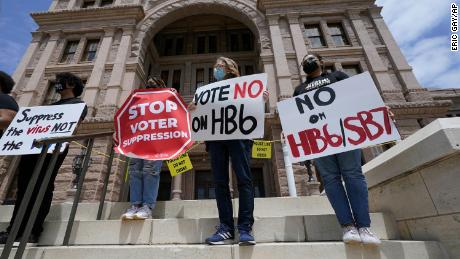The measure moves Texas closer to joining Florida, Georgia and other states that have seized on former President Donald Trump’s lies about widespread voter fraud and enacted new laws that make voting harder for some of their states’ residents.
CNN obtained a draft with the expected final language of SB7 and has read through that language.
It comes after days of negotiations between Republicans in the state House and Senate — which had passed different versions of restrictive voting legislation — on a final bill in the waning hours of Texas’ legislative session. The final draft of Senate Bill 7 still needs to clear both chambers before being sent to Republican Gov. Greg Abbott, who has indicated he would sign it into law.
The bill would ban after-hours voting — such as what Harris County, which includes Houston, and other major metropolitan areas offered in 2020, easing lines and helping shift workers. It would also prohibit ballot drop boxes and the drive-through voting centers that the heavily Democratic Harris County used.
It would mandate that all weekday early voting take place sometime between 6 a.m. and 9 p.m., but the draft language would further limit Sunday early voting to a maximum between the hours of 1 p.m. and 9 p.m., a time constraint Democrats and voting rights activists tell CNN that they fear could add a hurdle to “Souls to the Polls” after-church, get-out-the-vote efforts in Black and Latino communities.
“They want to create long lines so that people of color — it’s more difficult for them to vote on Sundays right after they go to church,” said Democratic state Rep. Rafael Anchiá. “That’s really what this bill is about: to have a chilling effect on voters of all stripes, and especially hard hit will be people of color.”
The bill would make it illegal for elections officials to send applications to vote by mail to people who did not request one. And it would bar counties from helping facilitate the distribution of unsolicited ballot requests — preventing them from working with get-out-the-vote groups.
Voters requesting absentee ballots would be forced to provide their driver’s license number or Social Security number on both their request for a ballot and their return envelope containing their ballot.
It would also impose $1,000-a-day fines on local election officials who do not follow prescribed procedures to update their voter rolls, and criminal penalties on election workers who obstruct poll-watchers. Those partisan poll-watchers would see their power expanded, allowing them to be “near enough to see and hear” election activity. The bill does, however, mandate that the poll watchers take an oath promising not to harass or disrupt voters or the voting process.
The bill would also make it easier to overturn an election, allowing courts to throw out results if enough ballots were cast illegally that it could have made a difference — rather than proving that fraud actually altered the outcome of a race.
President Joe Biden on Saturday afternoon condemned the Texas measure, calling it “wrong and un-American.”
“Today, Texas legislators put forth a bill that joins Georgia and Florida in advancing a state law that attacks the sacred right to vote,” Biden said in a statement first provided to The Texas Tribune. “It’s part of an assault on democracy that we’ve seen far too often this year — and often disproportionately targeting Black and Brown Americans.”
Republican lawmakers’ decision to advance the measure despite objections from major corporations based in Texas, including American Airlines and Dell, is another test of corporations’ appetite for a brawl with the GOP officials who make policy in Texas and other red states.
It has also spurred a new round of calls from Biden, Democratic officials and progressive activists for Congress to pass the “For the People Act,” which would impose national voting standards that would supersede many of the restrictions imposed by GOP legislatures and governors.
In a Friday statement announcing an agreement, committee chairs Sen. Bryan Hughes and Rep. Briscoe Cain called the bill “the product of years of hard work and deliberations by current and past legislators,” adding that “the Texas legislature has not bent to headlines or corporate virtue signaling.”
The final version of the bill must be voted on by both chambers in a simple majority vote by midnight Sunday as the state’s legislative session ends on Monday. Republican Gov. Greg Abbott has praised both the original House and Senate versions, calling the subject matter a top legislative priority, and has indicated he will sign the bill into law.
In an interview with CNN, Hughes said Harris County “tried to rewrite the law” in the 2020 election with drive-through and 24-hour voting. Those practices, he said, made it harder to find poll watchers.
“And if the vote is in question, and folks don’t know that the law is being followed, what is that gonna do to turnout? What is that going to do to people’s confidence in the election?” he said. “That doesn’t target any particular county. It applies to every county across the state.”
“One county tried to change the law. And one county doesn’t get to do that,” Hughes said.






